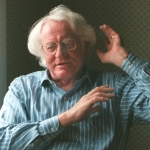His army jacket bore the white rectangle
of one who has torn off his name. He sat mute
at the round table where the trip-wire veterans
ate breakfast. They were foxhole buddies
who went stateside without leaving the war.
They had the look of men who held their breath
and now their tongues. What is to say
beyond that said by the fathers who bent lower
and lower as the war went on, spines curving
toward the ground on which sons sat sandbagged
with ammo belts enough to make fine lace
of enemy flesh and blood. Now these who survived,
who got back in cargo planes emptied at the front,
lived hiddenly in the woods behind fence wires
strung through tin cans. Better an alarm
than the constant nightmare of something moving
on its belly to make your skin crawl
with the sensory memory of foxhole living.




Comment form: